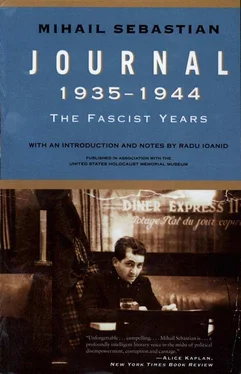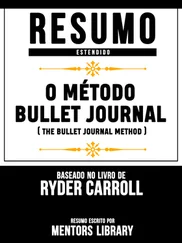At the end (Ghiţa 4was there, overwhelming in his silence, as well as Mircea and Vasile Băncilă 5) I reminded him of his article from May 1928, “What Young People Think,” in which he asserted in discussion with Petrovici 6that the orientation of the younger generation should be sought not in the street — where the agitators and window-breakers are — but in libraries and the representative values they contain.
“Yes, that’s how it was then,” he replied imperturbably. “Now it’s completely different. Then it was the hour of the intellect — now it is the hour of politics.”
Poor Nae! How rapid is his descent. .
To stay with politics, I should also record the short sharp discussion I had with Mircea after the theatre on Monday evening, at the Continental. It was not the first. And I have noticed that he is sliding ever more clearly to the right. When we are alone together we understand each other reasonably well. In public, however, his right-wing position becomes extreme and categorical. He said one simply shocking thing to me, with a kind of direct aggressiveness: “All great creators are on the right.” Just like that.
But I shan’t allow such discussions to cast the slightest shadow over my affection for him. In the future I shall try to avoid “political arguments” with him.
I should also note the trial of Credinţa, at which my pleading went down well. 71 could sense this not only from the court’s attention, but also from the congratulations of the people sitting on my bench and the irritation of those on the opponents’. I sensed it from the silence and from the nervous flow that suddenly raised the proceedings above the previous level of jokes and skirmishes.
Of course, everyone who spoke in defence of Credinţa was at pains to inform the court that I was a yid. Medrea 8promised to beat me up. I told Maryse, 9only half joking, that I am waiting for the day when Vulcănescu, Gabriel, Titel, and Tell 1make their peace with Sandu Tudor, Stancu, and Medrea, and discover that the Jews are alone responsible for the quarrel — especially myself, who has aroused discord among the Christian fraternity. It sounds like a joke, but it’s plausible enough.
Otherwise nothing. I become more dull-witted every day and seem no longer to expect any salvation.
2:30 a.m.
I am dead tired. Tomorrow morning I have to be writing at my desk by eight at the latest, but I must record here and now the startling admission that Maryse made to me. I shall try to write it down exactly as she said it.
“You don’t know how much I’ve suffered because of you. I wanted to sleep with you, come what may. You obsessed me. One week was complete torture — even physically, you know. Do you remember when I came to collect you from the Rampa 2and we left together in the car? That day I was determined to speak openly with you, because I saw that otherwise you didn’t or wouldn’t understand. I had made up my mind to take charge of all the most awkward details: to find a room for us to meet, to take you there, to make all the preparations. . But it was the day you had a toothache! If you hadn’t been in pain, I would certainly have been yours. I wouldn’t have hesitated to tell you — and you wouldn’t have been able to refuse. No man ever refuses.
“In the early days — after the first evening we were at Zissu, do you remember? — I decided to go to your place one day, to undress, lie down, and wait for you. You’d have found me there and had no choice. But meanwhile you gave me a copy of Femei, and I saw that even then I’d only have been repeating an episode from the past. I felt disgusted with myself and called it off, especially as you’d have thought I was copying your heroine.
“Then at the Corso, when we had lunch together, I had come to say everything and to ask everything of you, but you asked me to let you continue writing an article of yours. I never had any reservations, but you refused to understand. .
“I’m telling you this now because I think it has passed. It’s no longer topical. I wanted it too much then for it to give me any pleasure now. I tell you, I was crazy. With Gheorghe, and with Gheorghe’s mother, I spoke of nothing but you. How much I could suffer!
“What? Do you think I wouldn’t have been unfaithful to Gheorghe? Do you think I’m not unfaithful to him? Well, I am, with one man or another — not very often, but when I fancy someone, what am I supposed to do? I think I’d be stupid to refuse that. I love him, but I don’t think that has anything to do with it. Just once, in Constanta, when I spent three days alone with a guy who was after me and whom I fancied a lot myself, I did resist — I don’t know whether it was from stubbornness or stupidity. Anyway, I haven’t gotten over it even today.”
Sceaux
I am in Paris and still do not quite realize it. I think I shall only recover my reason in ten days’ time, after I have left.
There seems indeed to be something unreal in this return that cancels five years of my life, as if they had never existed. On Saturday evening I had dinner at Fanny Bonnard’s in Yerres. I found her the same as ever, and it seemed completely absurd to think that there are five years between us. A curious feeling of old age.
One morning I went for a walk in the area around rue de la Clef. Nothing at all has changed — not even myself, for I am not bringing back after these five years anything more than I already knew and experienced in 1930 as a young man of twenty-two to twenty-three. I walked up rue Soufflot, saw again the Sainte Geneviève Library, continued along rue Clovis, rue Mouffetard, rue Monge, rue de la Clef, and rue Lacépède, and went into the Jardin des Plantes where I lingered for a while beneath the great cedar. I am honestly unable to convince myself that the time has gone by.
But I don’t intend to write in this notebook, which I have brought along for no purpose.
Maybe I shall sum it all up in Bucharest.
And now, having failed to do it at the right time, I no longer feel like summarizing here the recent stages of my love affair with Leni. We love each other — we said as much and parted in complete harmony, with an embrace. I wonder what will become of me in Bucharest. I have a talent for making my unhappy life as complicated as possible.
Footnotes
1. Poldy (Pierre) Hechter: Sebastian’s elder brother, a doctor. He lived in France.
2. When Sebastian’s publisher invited Nae Ionescu to write an introduction to For Two Thousand Years, Ionescu contributed a viciously anti-Semitic piece.
3. Nae Ionescu: chief Iron Guard ideologist and professor of philosophy at the University of Bucharest, early mentor of Sebastian.
4. Following the assassination in 1933 of Prime Minister I. G. Duca by members of the Iron Guard, Nae Ionescu was placed under police surveillance and the publication of his newspaper Cuvântul was suspended.
5. Nina Mares: first wife of Mircea Eliade.
6. Petru Manoliu, Sandu Tudor, and Zaharia Stancu were editors at Credinţa, which a year earlier had harshly criticized Nae Ionescu and the Criterion association.
7. Members of the anti-Semitic League of the National Christian Defense (LANC) and of the Iron Guard were campaigning for the disbarment of Jewish attorneys.
8. Istrate Micescu: lawyer, minister of justice in the anti-Semitic government of Goga-Cuza (1937–1938). The movement to which Sebastian refers is the Iron Guard.
9. Scarlat Froda: theatre director and literary critic.
1. “Benu”: Andrei Sebastian, the writer’s younger brother. He changed his surname after his brother did. He eventually emigrated from Romania with Sebastian’s diary.
Читать дальше











